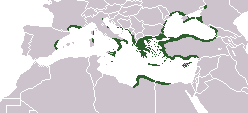julia90
Passione Mediterranea
- Messages
- 1,152
- Reaction score
- 65
- Points
- 48
- Location
- Florence-Lucca
- Ethnic group
- Tuscan-Italian-(European)
- mtDNA haplogroup
- H5b
Many of the new Hellenic cities became very rich and powerful, like Neapolis (Νεάπολις, Naples, "New City"), Syracuse, Acragas, and Sybaris (Σύβαρις). Other cities in Magna Graecia included Tarentum (Τάρας), Epizephyrian Locri (Λοκροί Ἐπιζεφύριοι), Rhegium (Ῥήγιον), Croton (Κρότων), Thurii (Θούριοι), Elea (Ἐλέα), Nola (Νῶλα), Ancona (Ἀγκών), Syessa (Σύεσσα), Bari (Βάριον), and others.
Following the Pyrrhic War in the 3rd century BC, Magna Graecia was absorbed into the Roman Republic.
During the Early Middle Ages, following the disastrous Gothic War, new waves of Byzantine Christian Greeks came to Magna Graecia from Greece and Asia Minor, as Southern Italy remained loosely governed by the Eastern Roman Empire.
Moreover the Byzantines would have found in Southern Italy people of common cultural root, the Greek-speaking eredi ellenofoni of Magna Graecia.
Greeks re-entered the region in the 16th and 17th century. This happened in reaction to the conquest of the Peloponnese by the Ottoman Turks. Especially after the fall of Coroni (1534) large numbers of Greeks and Albanians sought, and were granted, refuge in the areas of Calabria, Salento and Sicily. The Greeks from Coroni - the so called Coronians - belonged to the nobility and brought with them substantial movable property. They were granted special privileges and given tax exemptions. Another part of the Greeks that moved to Italy came from the Mani region of the Peloponnese. The Maniots were known for their proud military traditions and for their bloody vendettas (another portion of these Greeks moved to Corsica; cf. the Corsican vendettas). These migrations strengthened the depopulated Italian south with a culturally vibrant and militarily capable element.
A remarkable example of this influence is the Griko-speaking minority which still exists today in the Italian regions of Calabria and Apulia. Griko is the name of a language combining ancient Doric, Byzantine Greek, and Italian elements, spoken by people in the Magna Graecia region. There is a rich oral tradition and Griko folklore, limited now, though once numerous, to around 30,000 people most of them having become absorbed into the surrounding Italian element. Some believe that the origins of the Griko language may ultimately be traced to the colonies of Magna Graecia.
Griko speeking areas

Griko people from Bovesia (Aspromonte)
The Griko people traditionally spoke the Griko language which is a form of the Greek language. In recent years the number of Griko who speak the Griko language has been greatly reduced; the younger Griko have rapidly shifted to speaking the Italian Language.[10] Today, they are mostly Byzantine Catholics belonging to the Catholic Church of Eastern Rite, with a Roman Catholic minority.
Griko from Salento
Pizzica dance, has connection with ancient Baccanale's/Dionisiac dances (dance from Salento, historical greek and griko civilization)
The Griko language is a form of the Greek language which is spoken by the Griko people in the Magna Graecia region in southern Italy. The Griko language is the distinctive Greek dialect and ancestral mother-tongue of the Griko people. It is known as Katoitaliotika (Greek: Κατωιταλιώτικα, "Southern Italian") or Grekanika (Γραικάνικα) in Greece mutually intelligible to some extent with Standard Modern Greek. The Griko language survived far into the Middle Ages,[55] although greatly reduced it preserves features, sounds, grammar, and vocabulary of both Ancient Greek[41] particularly "the common dialect of Ancient Greek" known as Koine[55] and Medieval Byzantine Greek.[56][57][58] The Griko language is in a state of attrition due to language shift towards Italian and large-scale internal migration to the cities and subsequent intermingling of the population during the 20th century. The Griko language is classified as severely endangered[10] and the number of Griko people who speak their ancestral language has diminished in recent decades, today it is spoken by roughly 20,000 predominantly elderly people, the youngest fluent speakers tend to be over thirty years old.[10] The Griko language has been influenced more by the Italian than any other Greek dialects. The Italian government does little to protect the progressively eroding language and culture of the Griko people despite Article 6 of the Italian Constitution which authorizes the preservation of ethnic minorities.[9] The use of the Italian language is compulsory in public schools, the Griko language, on the other hand, is not taught to Griko youth at all.[59] The Ndrangheta which is the name of the Calabrian Mafia is a word of Calabrian Greek origin.
videos
http://video.google.com/videoplay?docid=4706451509581263470#
http://video.google.com/videoplay?docid=-6111280193251464210#
http://www.youtube.com/watch?v=dsjBQw7Pmv4
http://www.youtube.com/watch?v=r9db1IHU-zs
http://www.youtube.com/watch?v=UG-Igrzhh28
http://www.youtube.com/watch?v=_DwauXY4gQw
http://www.youtube.com/watch?v=l15YXf4aQ7k
http://www.youtube.com/watch?v=mkrWMKFr1Gc
http://www.youtube.com/watch?v=I_atZH23-bk
http://www.youtube.com/watch?v=U1bLvlVgR_E



